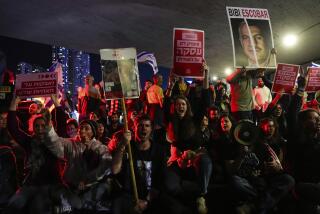Israel, Palestinians begin talks on permanent truce in Gaza Strip
As a three-day cease-fire in the Gaza Strip held Monday, Israeli negotiators returned to Cairo for talks with Egyptian officials and indirect discussions with Palestinian militants about a permanent truce and long-term arrangements.
There were reports in Israeli and Palestinian news media that Israel was willing to offer concessions to Hamas militants that would slightly ease some of the economic and border restrictions in Gaza, but the reports could not be confirmed.
Banks and shops reopened in Gaza, allowing people to cautiously resume their routines. Many used the promise of a safe morning to return to the neighborhoods they had fled weeks ago, checking on the state of their homes and property, while medical teams searched for bodies in the rubble of destroyed buildings.
In Israel’s south, residents welcomed the calm but remained relatively close to bomb shelters.
The Egyptian-brokered talks appear to focus on Hamas’ demand that the blockade of the Palestinian territory be lifted to open its border crossings with Egypt and Israel.
Israel has demanded an end to attacks from Gaza and a mechanism to ensure that militants do not exploit border crossings and the movement of goods. Israel reportedly won’t object to the easing of some restrictions, but its officials are calling for the demilitarization of the strip in return for a commitment to Gaza’s rehabilitation.
According to Palestinian and Israeli news media, Israel agreed to release Palestinian prisoners in exchange for the remains of two Israeli soldiers, increase permits for Gazans to enter Israel at the Erez crossing and increase the number of trucks going into Gaza.
Israel also reportedly is willing to expand the fishing zone off Gaza to six miles from three miles, not the 12 miles that Hamas is said to want. Israel reportedly rejected proposals to allow an airport and seaport to be built and insisted on being able to supervise goods being shipped into Gaza to ensure that there are no “dual use” products with military applications.
“Terrorists don’t get seaports or other rewards,” Israeli Justice Minister Tzipi Livni said.
Both sides have suggested that although they would prefer a negotiated settlement, they are willing to resume fighting.
After persuading the two sides to hold their fire for 72 hours, Egypt is attempting to mediate between Hamas’ demands and Israel’s security concerns, with its own interests playing a key role.
Israeli Public Security Minister Yitzhak Aharonovitch said he was not optimistic about reaching sustainable agreements in that time. The gap between the sides is so wide that “it will take a magician to bring a long-term settlement,” he said in a Web broadcast.
Early reports from Cairo suggested that Hamas would give high priority to a number of demands, including salaries for civilian employees of Hamas-run Gaza and the opening of the Rafah border crossing by Egypt, both of which would also involve the Palestinian Authority.
In an interview Monday, Livni, who is Israel’s chief peace negotiator, said demilitarization of Gaza was a long-term objective. The immediate goal is stopping the rocket fire by Hamas and arranging for close supervision of materials and aid transferred to Gaza to ensure that they benefit civilians, not militants.
Livni said she hoped that a future agreement could bring the Gaza Strip back to the control of the Palestinian Authority and away from Hamas, which is considered a terrorist group by Israel and the U.S.
“It would be a missed opportunity if this discussion focuses strictly on achieving calm,” she said.
Israeli Prime Minister Benjamin Netanyahu planned to convene his security Cabinet on Tuesday to discuss the Cairo talks.
Sources close to the talks told an Israeli news site that Egypt intended to return its ambassador to Israel if the negotiations succeeded in securing a long-term arrangement. Egypt recalled its ambassador after Israel’s previous military offensive on Gaza in 2012.
Also Monday, the United Nations Human Rights Council appointed the members of the commission it announced last month to investigate suspected Israeli violations of international humanitarian and human rights laws in the Palestinian territories, especially Gaza. Israeli officials have said the country will not cooperate with the commission.
Sobelman is a special correspondent. Special correspondents Maher Abukhater in Ramallah, West Bank, and Amro Hassan in Cairo contributed to this report.
More to Read
Start your day right
Sign up for Essential California for news, features and recommendations from the L.A. Times and beyond in your inbox six days a week.
You may occasionally receive promotional content from the Los Angeles Times.






